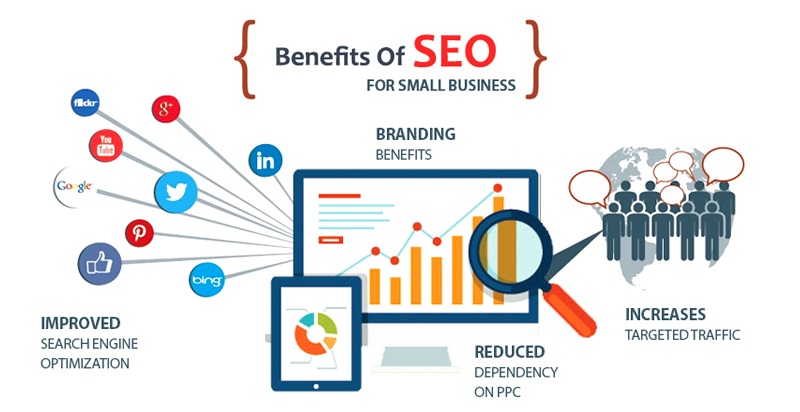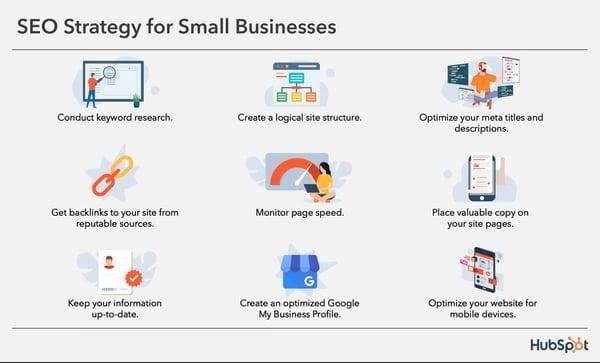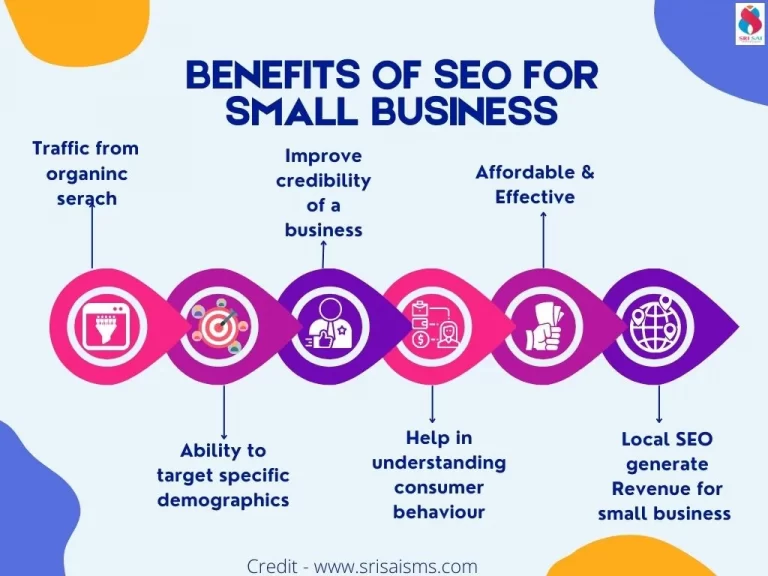Uncover the untold secrets of SEO and discover why it’s the key to small business success in today’s digital world.

Image courtesy of via DALL-E 3
Table of Contents
Introduction to SEO
SEO, which stands for Search Engine Optimization, is a vital tool for small businesses looking to make a mark on the internet. In simple terms, SEO helps your website appear more prominently in search engine results, making it easier for potential customers to find you online.
What is SEO?
Imagine the internet as a massive library with billions of books. SEO is like organizing your book in a way that the librarian (search engine) can quickly find and recommend it to readers (internet users). It’s all about making your website more visible and attractive to search engines like Google or Bing.
Why Small Businesses Need SEO
For small businesses, SEO is crucial because it can help you reach more customers without breaking the bank. By optimizing your website with the right keywords and strategies, you can increase your online presence and compete with bigger companies in the digital world.
How Search Engines Work
In simple terms, search engines are like giant libraries on the internet. When you type something into the search bar, the search engine’s job is to find the most relevant websites that match what you’re looking for.
How Search Engines Find Websites
Search engines send out special bots called crawlers to visit websites and read all the information on them. This process is called indexing. It’s like when you open a book and read all the pages to understand what it’s about.
How Websites are Ranked
After a search engine has read and understood all the information on different websites, it needs to decide which ones to show first in the search results. They do this by looking at a lot of factors, like how often a keyword appears on a website, how many other websites link to it, and how fast it loads. The websites that meet these criteria the best get to be on the first page of search results.
Keywords: The Building Blocks of SEO
In the vast world of the internet, keywords are like magic words that help people find what they’re looking for. Just like when you type a question into a search bar, those words are keywords that tell the search engine what you want to find.

Image courtesy of outreachfrog.com via Google Images
How to Find the Best Keywords
Choosing the right keywords for your website is crucial for attracting visitors. To find the best keywords, think about what words or phrases people might type into a search engine to find a business like yours. For example, if you have a bakery, words like “fresh bread,” “delicious cakes,” or “local bakery” could be great keywords to include on your website.
Optimizing Your Website
On-page SEO involves making specific changes directly on your website to improve its visibility to search engines. You can start by ensuring your website’s pages have relevant titles, headings, and content related to your business. This helps search engines understand what your site is about and increases the chances of it showing up in search results when potential customers are looking for products or services like yours.
Using Meta Tags
Meta tags are snippets of text that describe the content of a web page but are not visible on the page itself. They provide information about your site to search engines and influence how your website appears in search results. By optimizing your meta tags with relevant keywords and descriptions, you can improve your website’s chances of ranking higher in search engine results pages. Make sure to accurately reflect the content on your web pages to attract the right audience to your site.
Creating Quality Content
In this section, we will delve into how creating quality content can significantly impact the success of your website and help attract and retain visitors.

Image courtesy of blog.hubspot.com via Google Images
Why Quality Content Matters
Quality content is like a magnet for your website. When you have valuable, engaging information on your site, people are more likely to find it useful and come back for more. Search engines also love quality content because it shows that your website is trustworthy and relevant to users’ searches.
Ideas for Great Content
When creating content for your website, think about what your audience would find interesting or helpful. Here are some simple ideas for great content:
- How-to articles that guide users through a process related to your business
- Lists of tips or resources that can benefit your audience
- Case studies or success stories that demonstrate the value of your products or services
- Video demonstrations or tutorials showcasing your offerings
By consistently creating high-quality content that resonates with your target audience, you can build a loyal following and improve your website’s visibility in search engine results.
Building Backlinks
Building backlinks is an essential part of improving your website’s credibility and authority in the eyes of search engines. Backlinks are like votes of confidence from other websites that link back to yours. In simple terms, the more reputable websites that link to your site, the more trustworthy and valuable search engines consider your content.
What are Backlinks?
Backlinks, also known as inbound links or incoming links, are links from other websites that direct users to your site. Think of them as recommendations or endorsements from other websites that vouch for the credibility and relevance of your content. The quantity and quality of backlinks to your site play a crucial role in determining your website’s authority and ranking in search engine results.
How to Get Backlinks
Getting backlinks to your website requires a strategic approach to link building. Here are some simple tips on how to acquire backlinks:
1. Create High-Quality Content: Producing valuable and engaging content is one of the best ways to attract backlinks naturally. When your content is informative, shareable, and relevant to your target audience, other websites are more likely to link to it.
2. Reach Out to Other Websites: Identify websites that are relevant to your industry or niche and reach out to them to propose a partnership or collaboration. You can offer to guest post on their site in exchange for a backlink to your website, providing mutual value for both parties.
3. Utilize Social Media: Share your content on social media platforms to increase its visibility and reach. When others discover your content through social channels, they may decide to link back to it from their own websites or blogs.
4. Engage in Online Communities: Participate in online forums, communities, or industry-specific groups where you can share your expertise and knowledge. By providing helpful insights and solutions to others, you may attract backlinks from members of the community who find your contributions valuable.
By focusing on building quality backlinks from reputable sources, you can enhance your website’s authority, improve its search engine rankings, and ultimately drive more organic traffic to your site.
Local SEO for Small Businesses
When it comes to small businesses, attracting local customers is crucial for success. This is where local SEO, or search engine optimization, plays a vital role. In this section, we will explore how small businesses can use local SEO to target customers in their area and boost their online visibility.

Image courtesy of srisaisms.com via Google Images
What is Local SEO?
Local SEO is all about optimizing your online presence to attract more business from relevant local searches. When someone in your area searches for a product or service you offer, you want your business to show up in the search results. Local SEO helps you achieve this by making your business more visible to potential customers in your vicinity.
Setting Up Google My Business
One of the most important steps in optimizing your business for local searches is setting up a Google My Business profile. Google My Business is a free tool provided by Google that helps you manage how your business appears on Google Search and Maps. By creating and optimizing your Google My Business profile, you can ensure that your business information is accurate and up-to-date, making it easier for local customers to find you online.
Measuring Your SEO Success
In the world of SEO, it’s not just about implementing strategies, but also about tracking and measuring their impact. By monitoring your SEO efforts, you can see what’s working well and what areas need improvement. Let’s dive into how you can measure your SEO success in simple terms.
Why Measure SEO Success?
Measuring your SEO success is crucial because it helps you understand the effectiveness of your strategies. By tracking key metrics, you can see if your website is attracting more visitors, appearing in search results, and ultimately converting those visitors into customers. Monitoring your SEO efforts allows you to make informed decisions on how to optimize your website further.
Tools for Measuring SEO
There are several user-friendly tools available to help you track and measure the performance of your SEO campaigns. Google Analytics is a popular tool that provides insights into your website traffic, including the number of visitors, their behavior on your site, and the sources of your traffic.
Another helpful tool is Google Search Console, which shows you how your site appears in Google search results and provides information on keywords that are driving traffic to your site. By using these tools, you can gain valuable insights into the effectiveness of your SEO efforts and make data-driven decisions to improve your website’s performance.
Conclusion
Throughout this blog post, we have explored the world of SEO and its crucial role in helping small businesses grow and succeed in the digital landscape. By optimizing your website, understanding how search engines work, utilizing the power of keywords, creating quality content, building backlinks, leveraging local SEO, and measuring your SEO success, you can significantly improve your online visibility and attract more customers.

Image courtesy of www.linkedin.com via Google Images
SEO is not just about getting your website to the top of search results; it’s about connecting with your target audience and providing them with valuable information and solutions to their needs. By implementing the strategies outlined in this post, you can enhance your online presence, increase your website traffic, and ultimately drive business growth.
Remember, SEO is an ongoing process that requires patience and dedication. Keep track of your progress using analytics tools, continue to refine your strategies, and stay updated on the latest trends in the industry to stay ahead of the competition. With the right approach and commitment, SEO can propel your small business to new heights of success.
Want to turn these SEO insights into real results? Seorocket is an all-in-one AI SEO solution that uses the power of AI to analyze your competition and craft high-ranking content.
Seorocket offers a suite of powerful tools, including a Keyword Researcher to find the most profitable keywords, an AI Writer to generate unique and Google-friendly content, and an Automatic Publisher to schedule and publish your content directly to your website. Plus, you’ll get real-time performance tracking so you can see exactly what’s working and make adjustments as needed.
Stop just reading about SEO – take action with Seorocket and skyrocket your search rankings today. Sign up for a free trial and see the difference Seorocket can make for your website!
FAQs
Can I Do SEO by Myself?
Yes, you can definitely do SEO by yourself! While it may seem intimidating at first, there are plenty of resources available online that can help you understand the basics of SEO. By following some simple guidelines and consistently working on improving your website’s SEO, you can make a significant impact on your online visibility.
How Long Does SEO Take to Work?
SEO is a long-term strategy that requires patience. It typically takes a few months to see significant results from your SEO efforts. The time it takes for SEO to work depends on various factors such as the competitiveness of your industry, the quality of your website content, and the consistency of your SEO efforts. Keep working on your SEO, and you will gradually see improvements in your website’s rankings and traffic.







